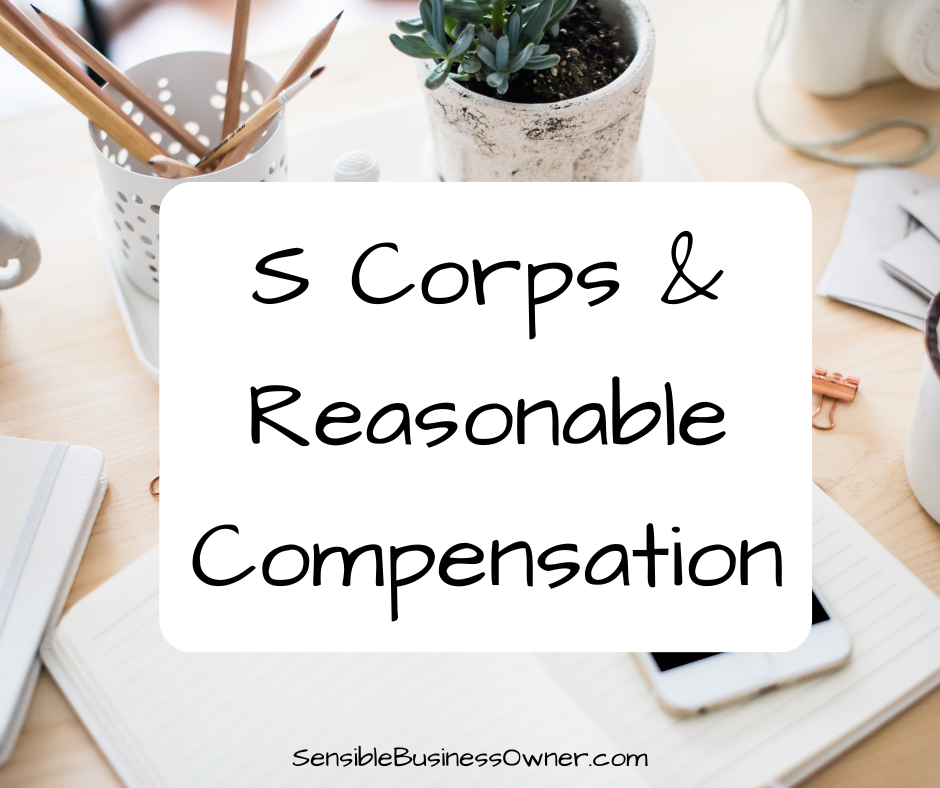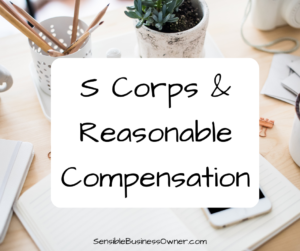Reasonable Compensation for S Corp Owners
Are you the owner of an S Corporation (S Corp)? Did you know that S corp owners are classified as employees and are required by law to be
paid reasonable compensation (wages) and have it processed through W2 payroll? This question brings up two different requirements.
1. The compensation amount should be reasonable.
2. Compensation must be paid through payroll (wages), have taxes withheld, and be reported on the annual W2.
Why does it matter?
An advantage to structuring a business with an S corp tax election is the ability to reduce taxes through distributions. An owner can decide the total amount of pay they want each year and pay part with W2 payroll and the remainder as a distribution. Where they differ, compensation is subject to Medicare and Social Security tax at both the employee and employer levels. The employee has 7.65% withheld from their pay and the employer matches resulting in a company expense of 7.65% (totaling 15.3%). Conversely, distributions to the owner are not subject to payroll taxes resulting in a savings of 15.3%.
This strategy can save thousands of dollars in taxes. However, the strategy has some complexities that must be understood in order to not only realize the savings but to avoid penalties. In addition, before an S corp owner can take distributions, they must first be paid a reasonable salary through W2 payroll.
Keep in mind, a reasonable salary only comes into play if distributions of any kind* are paid. However, wages must always be paid through W2 payroll.
Reasonable Compensation Defined
According to the IRS, “Reasonable compensation is the value that would ordinarily be paid for like services by like enterprises under like circumstances. Reasonableness is determined based on all the facts and circumstances”.
There are many factors to consider in determining S Corp owner reasonable compensation. Some to consider are:
- How much time is devoted to the business
- What Duties and responsibilities are provided
- Level of training and experience
- What like enterprises pay for similar services
- Industry
- Geographical location
Information can be found on the IRS website for tips on how these factors are used to calculate reasonable compensation.
Facts to keep in mind:
- An S corporation owner can be paid W2 wages, of any amount, without taking distributions.
- An S corporation owner cannot take distributions, of any kind if a reasonable salary is not paid.
- If an S corporation does not have enough funds to pay the owner a reasonable salary that’s fine. But distributions, of any kind*, may not be paid.
- The IRS has the authority to reclass non-wage payments to wages if reasonable compensation has not been met. Thus moving payments not subject to employment tax to payments that are subject to employment tax. Resulting in back taxes, penalties, and interest owed.
*Note: Distributions of any kind are non-wage payments including cash distributions, payments of personal expenses, and owner loans.
We see the topic of keeping business and personal transactions separate come up often and here it is again. There are many legal and administrative reasons to not comingle, so just don’t do it.
Common Mistakes
To experience the highest tax savings with the S corp election, in relation to compensation, there is a specific strategy to perfect. Common mistakes include,
- An owner not being compensated with W2 wages but receiving distributions and/or payments of personal expenses. This method is bypassing employment taxes and is illegal. If you are doing this, stop. Determine a reasonable wage and start paying yourself this amount as w2 wages. Distributions can be taken above this amount.
- An owner taking too low of a W2 wage and receiving distributions of any kind. In this case, distributions can be reclassed by the IRS as wages and subject to employment tax. This would result in back taxes, penalties, and interest owed. If this is you, determine a reasonable wage and increase your W2 pay to this amount.
- An owner receiving W2 wages at a rate higher than reasonable compensation. This isn’t illegal but it doesn’t fully utilize the tax savings opportunities an S Corp provides. Amounts being paid in excess of reasonable salary would be better paid as distribution and eliminating the 15.3% employment tax.
An Example:
To demonstrate this strategy below is an example showing the amount of employment taxes this particular S Corp owner could save after determining a reasonable compensation amount.
An S Corp owner is taking a total payment amount of $125,000. $100,000 as wages (subject to 15.3% employment tax) and $25,000 as distribution (not subject to 15.3% employment tax).
Employment tax calculation $100,000 X 15.3%=15,300
The S Corp owner has a Reasonable Compensation Survey performed and it’s determined reasonable compensation is $75,000. In the next year, the owner is paid wages of $75,000 (subject to 15.3% employment tax) and $50,000 in distributions (not subject to 15.3% of employment tax).
Employment tax calculation $75,000 X 15.3%=11,475
In this example, the result of paying wages higher than reasonable salary is an increase in employment taxes of $3,825. Or in other words, giving the IRS money that could stay in your pocket. If you fall in this category, determine your reasonable compensation and reduce your W2 wages to this amount.
Like Many IRS regulations, there is an exception to the rule. IRS fact sheet FS-2008-25 states, “…an officer of a corporation who does not perform any services or performs only minor services and who neither receives nor is entitled to receive, directly or indirectly, any remuneration. Such an officer would not be considered an employee.”
How can you protect yourself and your business?
Documentation is key to backup any position with the IRS or courts. If you don’t have clear documentation detailing the factors used to calculate your compensation you’re leaving yourself and your business vulnerable in an audit.
We have tools available to help you accurately determine your reasonable compensation figure. Please contact us if you would like us to complete a Reasonable Compensation Report for you. A Reasonable Compensation Report is an independent unbiased report that uses criteria outlined by the IRS and Courts to determine an individual’s reasonable compensation. It also provides a defensible position in an IRS challenge. Reports starting at $550.00.
Note: This service is for U.S. businesses with the S Corp tax structure or U.S. businesses in the process of electing S Corp status.
~ Brandon & Christi are successful business owners who enjoy traveling and making a mess in the kitchen with their two daughters.
The article is for informational purposes only and should not be construed as business, accounting, or legal advice. Details are subject to change without notice.
Copyright © 2022, Brandon & Christi Rains, Rains Group LLC DBA The Sensible Business Owner, ALL RIGHTS RESERVED














